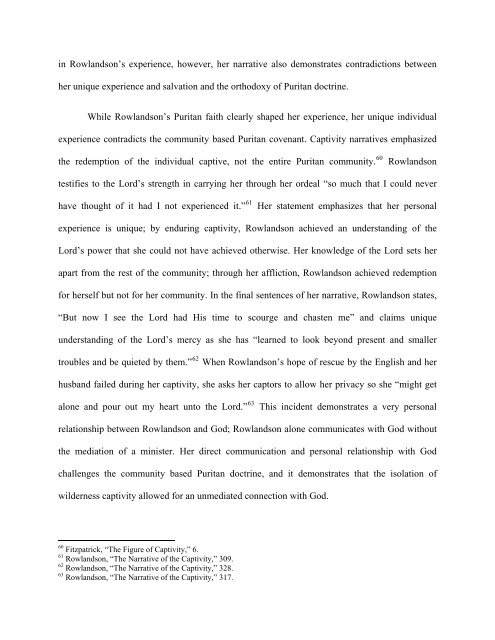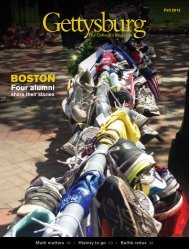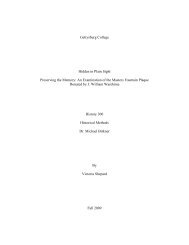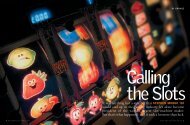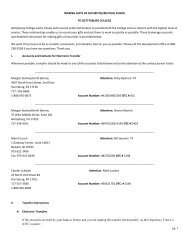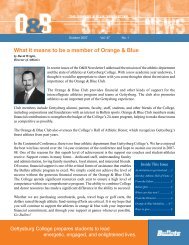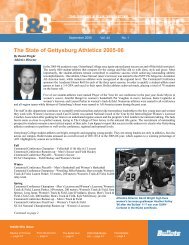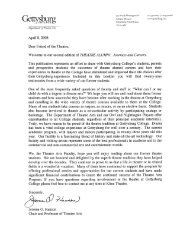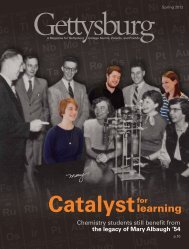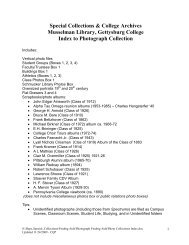Sweet Tooth for Empire: Sugar and the British Atlantic World
Sweet Tooth for Empire: Sugar and the British Atlantic World
Sweet Tooth for Empire: Sugar and the British Atlantic World
Create successful ePaper yourself
Turn your PDF publications into a flip-book with our unique Google optimized e-Paper software.
in Rowl<strong>and</strong>son’s experience, however, her narrative also demonstrates contradictions between<br />
her unique experience <strong>and</strong> salvation <strong>and</strong> <strong>the</strong> orthodoxy of Puritan doctrine.<br />
While Rowl<strong>and</strong>son’s Puritan faith clearly shaped her experience, her unique individual<br />
experience contradicts <strong>the</strong> community based Puritan covenant. Captivity narratives emphasized<br />
<strong>the</strong> redemption of <strong>the</strong> individual captive, not <strong>the</strong> entire Puritan community. 60 Rowl<strong>and</strong>son<br />
testifies to <strong>the</strong> Lord’s strength in carrying her through her ordeal “so much that I could never<br />
have thought of it had I not experienced it.” 61 Her statement emphasizes that her personal<br />
experience is unique; by enduring captivity, Rowl<strong>and</strong>son achieved an underst<strong>and</strong>ing of <strong>the</strong><br />
Lord’s power that she could not have achieved o<strong>the</strong>rwise. Her knowledge of <strong>the</strong> Lord sets her<br />
apart from <strong>the</strong> rest of <strong>the</strong> community; through her affliction, Rowl<strong>and</strong>son achieved redemption<br />
<strong>for</strong> herself but not <strong>for</strong> her community. In <strong>the</strong> final sentences of her narrative, Rowl<strong>and</strong>son states,<br />
“But now I see <strong>the</strong> Lord had His time to scourge <strong>and</strong> chasten me” <strong>and</strong> claims unique<br />
underst<strong>and</strong>ing of <strong>the</strong> Lord’s mercy as she has “learned to look beyond present <strong>and</strong> smaller<br />
troubles <strong>and</strong> be quieted by <strong>the</strong>m.” 62 When Rowl<strong>and</strong>son’s hope of rescue by <strong>the</strong> English <strong>and</strong> her<br />
husb<strong>and</strong> failed during her captivity, she asks her captors to allow her privacy so she “might get<br />
alone <strong>and</strong> pour out my heart unto <strong>the</strong> Lord.” 63 This incident demonstrates a very personal<br />
relationship between Rowl<strong>and</strong>son <strong>and</strong> God; Rowl<strong>and</strong>son alone communicates with God without<br />
<strong>the</strong> mediation of a minister. Her direct communication <strong>and</strong> personal relationship with God<br />
challenges <strong>the</strong> community based Puritan doctrine, <strong>and</strong> it demonstrates that <strong>the</strong> isolation of<br />
wilderness captivity allowed <strong>for</strong> an unmediated connection with God.<br />
60 Fitzpatrick, “The Figure of Captivity,” 6.<br />
61 Rowl<strong>and</strong>son, “The Narrative of <strong>the</strong> Captivity,” 309.<br />
62 Rowl<strong>and</strong>son, “The Narrative of <strong>the</strong> Captivity,” 328.<br />
63 Rowl<strong>and</strong>son, “The Narrative of <strong>the</strong> Captivity,” 317.


